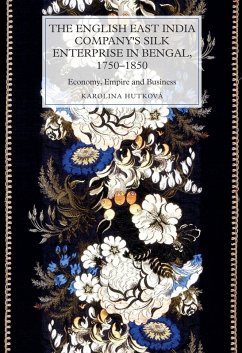This book examines the silk-processing activities of the English East India Company in Bengal.
This book examines the silk-processing activities of the English East India Company in Bengal and presents the Company as a manufacturer rather than a trading body or political agent. Silk was one of the first globally traded commodities; its luxury status and potential to create tax revenues and employ the poor gave it a strategic importance in many economies in Eurasia. The silk industry was also an important sector in Britain; yet, as raw silk could notbe produced domestically, the British government encouraged companies to source supplies from its colonies and the territories under its influence. Such projects proved to be challenging; the most successful was the English EastIndia Company's venture in Bengal, where the Company invested over 1 million into developing raw silk production to meet the demands of British weavers. A key component was the transfer of silk technologies from the West to the East - one of the first in this direction rather than vice versa. The outcome of this enterprise was influenced by the business and management capacities of the Company and by British and, eventually, imperial policies, with serious consequences for the Indian economy. The book ultimately presents a case of manufacturing failure, but one resulting from British imperial policies rather than colonial economies.
KAROLINA HUTKOVÁ is an LSE Fellow in Economic History at the London School of Economics and Political Science.
This book examines the silk-processing activities of the English East India Company in Bengal and presents the Company as a manufacturer rather than a trading body or political agent. Silk was one of the first globally traded commodities; its luxury status and potential to create tax revenues and employ the poor gave it a strategic importance in many economies in Eurasia. The silk industry was also an important sector in Britain; yet, as raw silk could notbe produced domestically, the British government encouraged companies to source supplies from its colonies and the territories under its influence. Such projects proved to be challenging; the most successful was the English EastIndia Company's venture in Bengal, where the Company invested over 1 million into developing raw silk production to meet the demands of British weavers. A key component was the transfer of silk technologies from the West to the East - one of the first in this direction rather than vice versa. The outcome of this enterprise was influenced by the business and management capacities of the Company and by British and, eventually, imperial policies, with serious consequences for the Indian economy. The book ultimately presents a case of manufacturing failure, but one resulting from British imperial policies rather than colonial economies.
KAROLINA HUTKOVÁ is an LSE Fellow in Economic History at the London School of Economics and Political Science.
Dieser Download kann aus rechtlichen Gründen nur mit Rechnungsadresse in A, D ausgeliefert werden.


